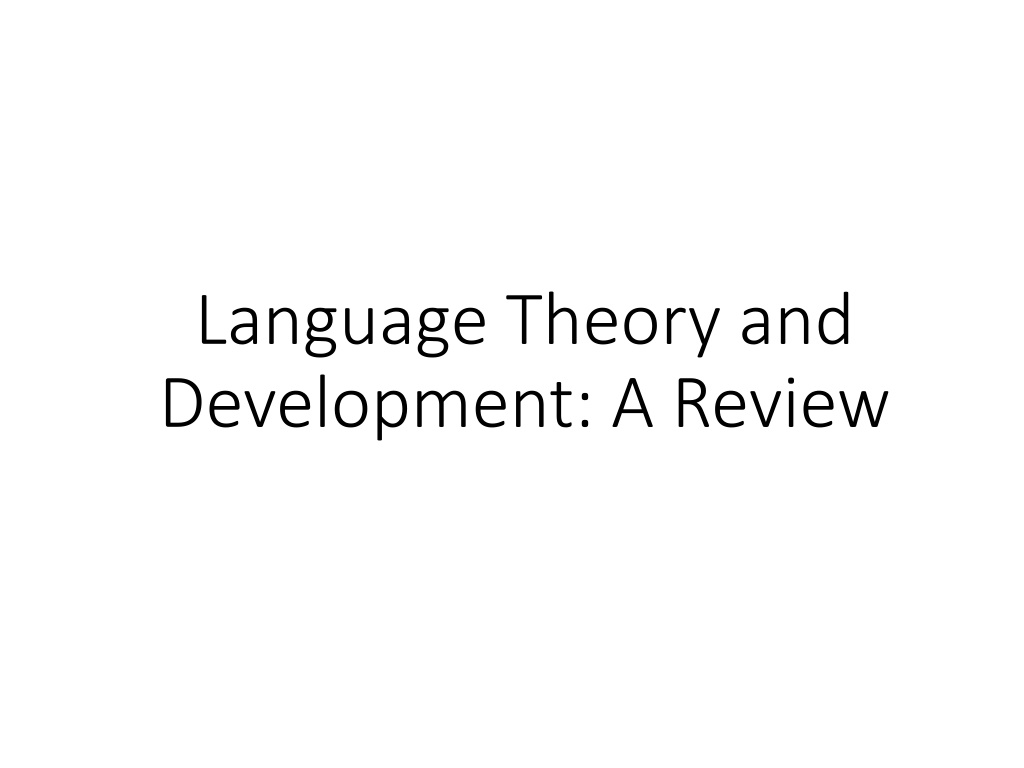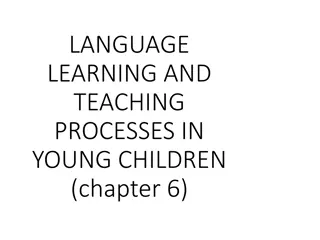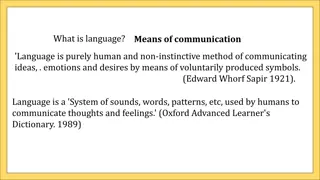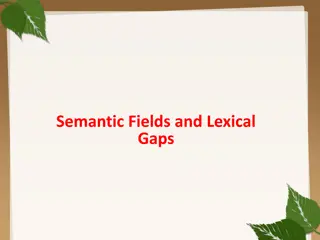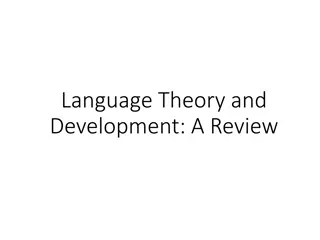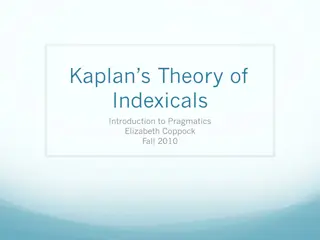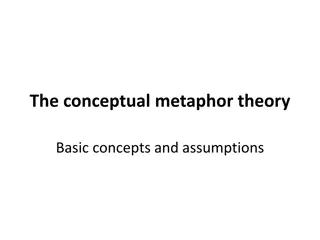Language Theory and Development: A Review
This review covers essential resources in communication sciences and disorders, multicultural strategies for special language needs, and advancements in social communication development and disorders. It also delves into effective strategies for managing challenging behaviors in individuals with ASD, ADHD, anxiety, and sensory processing issues. The PowerPoint outline included emphasizes theories, the relationship of specific language impairment to speech-language impairment, and developmental milestones for infants, toddlers, and preschoolers.
- Language theory
- Communication disorders
- Multicultural strategies
- Developmental milestones
- Challenging behaviors
Download Presentation

Please find below an Image/Link to download the presentation.
The content on the website is provided AS IS for your information and personal use only. It may not be sold, licensed, or shared on other websites without obtaining consent from the author. Download presentation by click this link. If you encounter any issues during the download, it is possible that the publisher has removed the file from their server.
E N D
Presentation Transcript
Language Theory and Development: A Review
Several new resources:** Fogle, P.T. (2023). Essentials of communication sciences and disorders (3rd ed.). Burlington, MA: Jones & Bartlett Learning.
Roseberry-McKibbin, C. (2022). ** Multicultural students with special language needs: Practical strategies for assessment and intervention (6thed.). Oceanside, CA: Academic Communication Associates. Roseberry-McKibbin, C., Hegde, M.N., & Tellis, G. (2024). Advanced review of speech-language pathology: Study guide for PRAXIS and comprehensive examination (5th ed.). Austin, TX: Pro-Ed. www.proed.inc
Hwa-Froelich, D.A. (2023). Social communication development and disorders (2nded.). Routledge. Levey, S. (2024). Introduction to language development (3rded.). Plural Publishing.
I went to a fabulous conference in Richmond, Virginia:** Kathryn Phillips (special ed and psychology background) Effective Strategies for Managing Challenging Behaviors and Teaching Executive Functioning Skills: ASD, ADHD, Anxiety, Sensory Processing
As always, I will give you some notes and you will fill in other slides
PowerPoint Outline I. Review of Theories A. Cognitive Theory (Piaget) B. Social Interactionism (Vygotsky) II. Review of Relationship of SSD to SLI III. Review of Typical Developmental Milestones A. Infant B. Toddler C. Preschool
Before we dive inthis slide is not on the exam What s the very latest terminology?** Language Impairment Specific Language Impairment Language Disorder Primary Language Impairment Developmental Language Disorder** (in 2020, 2021, 2022, 2023 journals)
Spicer-Cain et al. (2023). Early identification of children at risk of communication disorders: Introducing a novel battery of dynamic assessment for infants. American Journal of Speech-Language Pathology, 32, 523-544.
Park et al. (2020). Bilingualism and processing speed in typically developing children and children with developmental language disorder. Journal of Speech, Language, and Hearing Research, 64 (5), 1479- 1493.** They remind us that DLD is a neurodevelopmental disorder where language abilities fall significantly below age expectations in the absence of any known causes such as hearing loss, intellectual disability etc.
Park et al. 2020in addition to low language skills, these children have:
Always remember the Big 5 in language:** Syntax Morphology Phonology Semantics Pragmatics
Strong cognition hypothesis: language Cognition
Piagets stages of cognitive development: Sensorimotor (birth-2 years)
https://www.youtube.com/watch ?v=NjBh9ld_yIo Object permanence 2 Youtube video
Preoperational (2 Preoperational (2- -7 years) 7 years)
Clinical implications of the cognitive theory: language cognition
** Clinicians must assess and treat cognitive precursors to language and facilitate development of these precursors before working on language itself So, with a very young child, you would work on symbolic play and object permanence before you tried to have a child say her first word
Lev VygotskyRussian psychologist:** Language knowledge is acquired through social interaction with more competent and experienced members of the child s culture
This is why I believe.** That multiage child care is so important Mark s language development skyrocketed when, at 3, he left a small homecare of children his own age and entered a large preschool that also had an elementary aftercare program
Children benefit greatly from being around older kids! **
According to social interactionism theory:** Children first learn language in interpersonal interactions, then use this language to structure thought Language develops because children are motivated to interact socially with others around them
II. Relationship of Developmental Language Disorder to Speech Sound Disorders
Westby (ASHA Schools Conference Phoenix):
Often Speech sound disorder Language Impairment Speech Sound Disorder
Macrae, T., & Tyler, A.A. Speech abilities in preschool children with speech sound disorder with and without co-occurring language impairment. Language, Speech, and Hearing Services in Schools, 45, 302-313.**
Dr. Melanie Schuele, ASHA Schools Conference
III. Review of Typical Infant Language Milestones
At 9-12 months of age Youtube baby talk bla bla bla
Joint reference/attention is important:
